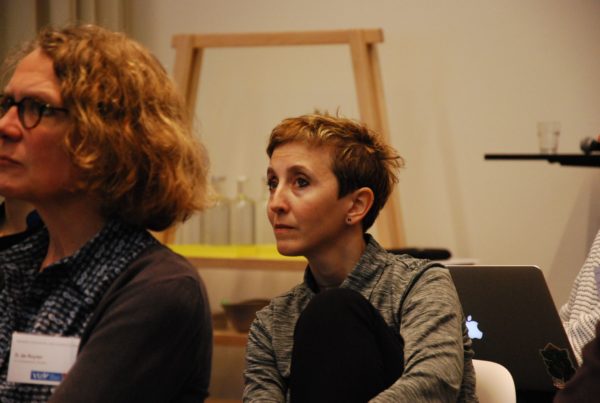Author: Jayashree Rajagopalan
Source: Editage Insight
Datum: December 6th, 2018
Picture: Lex Bouter
The prevalence of minor research misbehaviors is embarrassingly high: Prof. Lex Bouter
Prof. Lex Bouter is a distinguished name in the field of research integrity and it is an honor to have this conversation with him. In this interview, Prof. Bouter tells us about the Netherlands Research Integrity Network (NRIN) and how it encourages the development of best practices in research and reporting. He also reveals how his research and teaching experience led to his keen interest in the integrity of the scientific research and publishing processes. Prof. Bouter is convinced that globally, we need better infrastructure that provides ethics related guidance to researchers at all levels, because the prevalence of minor research misbehaviors that often go unreported is alarmingly high.
More about Prof. Lex Bouter: Following a Master’s degree in Medical Biology from Utrecht University in 1982 and a stint at teacher training colleges in Tilburg and Utrecht, Prof. Bouter went on to obtain a PhD in epidemiology from Maastricht University. By 1992 he was a tenured Professor of Epidemiology.
Prof. Bouter has held several influential positions in his career: Scientific Director of the EMGO+ Institute for Health and Care Research at the VU University Medical Center in Amsterdam (1992-2006); President of the Netherlands Epidemiological Society (1996-1997); a member of the Health Council of the Netherlands (2001-2013); Rector Magnificus and member of the Executive Board of the Vrije Universiteit Amsterdam (2006-2013); and Vice-Chair and Methodologist of the Dutch Central Committee on Research Involving Human Subjects (2001-2013). He has also served as Chair on several committees: a division of the VU University Medical Center (2001-2006); the program committee of the Innovative Medical Devices Initiative (since 2009) of the Netherlands Organisation for Health Research and Development; and the program committee of Replication Research (since 2016) of the Netherlands Organization for Scientific Research.
In the course of his academic career, Prof. Bouter developed an interest in the ethical aspects surrounding scientific research and its societal impact. He started advocating a focused global approach to tackle the dilemmas around scientific integrity. He currently focuses on teaching and research in the area of Methodology and Integrity. In 2017, he was appointed as a member of the Council for Medical Research of the Royal Netherlands Academy of Arts and Sciences; organized and co-chaired the 5th World Conference on Research Integrity in Amsterdam; and became chair of the World Conferences on Research Integrity Foundation.
Prof. Bouter has been the author/co-author of nearly 700 publications and his work has received over 48,000 citations. He is among the 400 most influential biomedical researchers and has supervised 74 PhD students. He has also been the Editor (1996-2002) and Editor-in-Chief (2002-2006) of the Cochrane Collaboration Back Review Group as well as one of the authors of the Textbook of Epidemiology.
Prof. Bouter, could you please tell us more about the Netherlands Research Integrity Network (NRIN)? Why was it established? What does it aim to achieve?
The Netherlands Research Integrity Network started during the last months of 2014 with a generous grant by the Netherlands Organisation for Health Research and Development. The idea behind it was simple and the aim was to establish a network for exchange of ideas and best practices among those involved in research and education in the emerging field of research integrity and responsible conduct of research. Additionally we wanted to offer a platform for confidential counselors and for chairs of standing committees that treat allegations of research misconduct. All this was motivated by the fact that the attention for these issues was increasing rapidly in my country, but still very few colleagues in each separate research institution were involved and little exchange between these isolated functionaries occurred.
What are some of the activities NRIN undertakes to achieve its mission? Also, does NRIN specifically focus on the Netherlands and cases related to research integrity in the region?
NRIN runs a website that tries to be a useful portal of resources for those involved in research and education in the field of research integrity, as well as for those responsible for sorting out allegations of research misconduct. The website leads the way to upcoming meetings, funding opportunities, codes of conduct, guidelines, teaching materials, books and videos. We also distribute Newsletters among persons who signed up from within Netherlands or abroad. Arguably more important are the meetings that NRIN organizes. Annually we have a well-attended conference on research and another one on education. We make these as lively and interactive as possible. Furthermore, we convene closed meetings for confidential counselors of research integrity matters and for chairs of standing committees that treat allegations of breaches of research integrity.
The NRIN website is consulted by people from many countries and about half of its registered users come from outside the Netherlands. The meetings attract participants from the Netherlands mainly, but we also have regularly guests from other countries.
Do you have any success stories of NRIN activities to share?
Our main claim to success is that the NRIN meetings are lively and well-attended. A more specific example is that we organized intensive consultation sessions with different stakeholder groups both at the initiation of the revision of the Netherlands Code of Conduct on Research Integrity and on its subsequent penultimate draft. This provided useful guidance for the writing committee and had an impact on the final version of revised code. Furthermore, we’re quite proud that NRIN played an important role in the organization of the 5th World Conference on Research Integrity that was held in May 2017 in Amsterdam.
I’d like to move to some issues that are closely aligned to your area of work. What sparked your interest in the integrity of the scientific research and publishing processes?
I’m an epidemiologist by trade and was a director of research institute with a focus on primary care and public health for 15 years. Subsequently I had the honor to serve my university as its rector for 7 years. Overlapping these functions I was the chief methodologist and vice-chair of the Netherlands Central Committee on Research involving Human Subjects for 12 years. These professional roles made me aware that research is not always performed as well as it should.
Although I was fascinated – like many – by the spectacular cases of research misconduct that were unmasked in my country and abroad, I quickly realized that minor research misbehaviors have a much more substantial impact on the aggregated level, due to their embarrassingly high prevalence. To remedy this I believe that we need to take care of the quality of research much more seriously. This should take the form of institutional codes, guidelines and standard operational procedures, education and skills training, internal audits, and most importantly creating a climate in which researchers feel free to discuss their professional errors, doubts and dilemmas. The issues are complex; we know very little because research on research only recently became a bit in vogue, and there probably is no magic bullet. Most likely we need concerted actions by all important stakeholders: researchers, their institutions and professional organizations, funding agencies, and scientific journals.
How do you teach/instruct researchers in the responsible conduct of research?
In the VU University Medical Center all PhD students follow an obligatory course in research integrity. Similar arrangements have been made in other faculties and universities in the Netherlands. Also in bachelors and masters programs, attention for research integrity is increasing steadily. Surprisingly little training is available for more senior levels of research staff. I often make the joke that we need a license for everything, but not for getting children and for supervising PhD students! We recently started a project that will pilot a research integrity training program for novice supervisors. I’m convinced that we need to offer better guidance for researchers at all levels, as poor mentoring and supervision are consistently reported to be an important driver of research misbehaviors.
The blended course that we offer for biomedical PhDs starts with an e-learning module to make sure that all participants have the same information and that we don’t have to spend time on transferring factual information during face-to-face meetings. Participants are required to complete a test on the contents of the e-learning module and to discuss its topics with their supervisors, focusing on the relevance of the e-module for their own research project. The program of the meetings – one full day and another half day 6 weeks later – deals with fostering the responsible conduct of research, preventing questionable research practices, and helping researchers deal with the daily dilemmas they have to face. We combine interactive lectures, small group discussions and sessions of Moral Case Deliberation (MCD) in which casuistry is used based on the experience of the participants. In these MCD sessions, dilemmas are analyzed systematically with a view to be able to understand the underlying norms and values better from the standpoints of the different stakeholders. The aim is that the course participants will learn to recognize and handle research integrity dilemmas more adequately. We believe that it’s important to discuss the matters at issue in an open and confidential atmosphere without moralizing or making accusations. The course is completed by a half pager self-reflection on the impact the training had and what was learned.
That’s an interesting approach to increase awareness and understanding of best and ethical practices, Prof. Bouter! And it’s great that NRIN is involved in fostering an exchange of ideas and thoughts on dealing with ethical dilemmas in research.
That brings us to the end of Part 1 of this interview. In the next segment, Prof. Bouter shares his thoughts about what different stakeholders in scholarly publishing could do to ensure that unethical practices are not encouraged.
This post The prevalence of minor research misbehaviors is embarrassingly high: Prof. Lex Bouter was originally published on Editage Insights.




